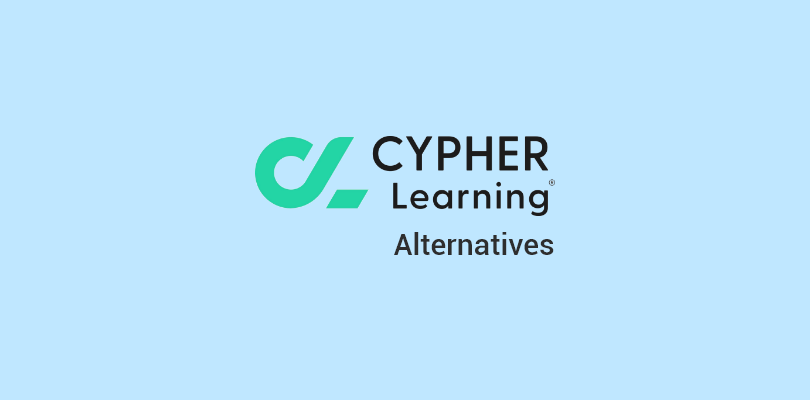If you’re here, chances are you’re hitting a wall.
Your team is growing, your compliance needs are getting more complex, and training has turned into a chaotic mix of spreadsheets, Zoom calls, and scattered documents that no one tracks, let alone finishes.
That’s not sustainable.
You need a system that speeds up onboarding, aligns teams, and gives you visibility without requiring a full-blown L&D department. A good LMS is the key, whether you’re doing all the training yourself or trying to scale it across remote employees, franchise locations, or client-facing programs.
What is an LMS? A Learning Management System (LMS) is a software platform that lets you create, deliver, manage, and track training—all from one place. Whether it’s for employee onboarding, compliance, reskilling, or external course delivery, an LMS gives you structure where chaos used to live.
No fluff. No generic advice. Just the best LMS tools built for small businesses—and how to pick one that actually works for you.
What you’ll find in this guide:
- A handpicked list of the top 10 LMS platforms tailored for small businesses
- Feature-level clarity on what each tool does best (and what it doesn’t)
- Use-case matching—onboarding, compliance, remote training, even course selling
- Step-by-step guidance to help you choose and implement without wasting weeks
Let’s get straight to the tools—so you can stop duct-taping your training and start scaling it with confidence.
| LMS | Best For | Key Features | Pricing | User Rating |
|---|---|---|---|---|
| ProProfs Training Maker | Employee training & LMS | - AI course builder - 200+ templates - SCORM & quizzes - Mobile access - Reports & analytics - Integrations (Salesforce, Mailchimp) | Free plan Paid plans from $1.99 per active learner/month | 4.8 (Capterra) |
| Absorb LMS | Complex training needs | - Personalized learning paths - AI automation - Content library - E-commerce - HRIS integrations | Custom pricing | 4.5 (Capterra) |
| Moodle | Open-source flexibility | - Free & customizable - SCORM support - Mobile access - Plugin ecosystem - Active user community | Free (self-hosted) MoodleCloud from $130/year | 4.3 (Capterra) |
| Docebo | Scalable enterprise learning | - AI content tagging - Workflow automation - Gamification - Social learning - Branded mobile app | Custom quote (3-tier plans) | 4.4 (Capterra) |
| iSpring Learn | eLearning & certification | - SCORM/xAPI support - Offline mobile app - Custom reports - Ready-made course library | From $3.70/user/mo (annual billing) | 4.6 (G2) |
| 360Learning | Collaborative learnizng | - Peer learning tools - Quizzes & feedback - Gamification - AI gap detection - Drip content | From $8/user/mo Business: custom | 4.6 (G2) |
| LearnUpon | Corporate L&D teams | - SCORM/xAPI - Multi-portals - Gamification - SSO + Salesforce - Multi-language support | 3-tier plans (user-based) | 4.6 (G2) |
| BrainCert | Gamified training & course sales | - Virtual classrooms - Gamification engine - AI analytics - eCommerce tools | From $49/year | 4.3 (Capterra) |
| SkyPrep | Online employee development | - AI assistant - Workflow automation - SCORM support - Gamification - Zoom integration | Tiered plans | 4.6 (G2) |
| Litmos | Off-the-shelf course libraries | - 98,000+ ready-made courses - AI playlists - Gamification - Mobile access - ILT/vILT support | Custom suite pricing | 4.2 (Capterra) |
Top 10 LMS for Small Businesses in 2025
I’ve created this list using a fair and simple approach. I looked at user reviews, key features, ease of use, customer support, and whether each tool offers good value for money. I also included insights from my experience and expert opinions to give you a well-rounded view. This ensures you get honest, useful information to help you choose the right LMS.
1. ProProfs Training Maker
If you’re a startup or business operating lean, ProProfs Training Maker is among the top LMS for small business. It’s designed to make creating courses, quizzes, and certificates super simple, without a steep learning curve or long setup.
Since it’s AI-powered, I could create unlimited courses quickly without spending hours building everything from scratch. The AI helps streamline course setup, making the whole process faster and more intuitive.
You also get cool features like mobile learning, automated reminders, and a learner dashboard to track progress. Once your team grows (and it will!), you might find yourself eyeing the Business Plan. It has premium expert-taught courses, advanced reporting, and integrations to make training seamless.
Best For: Employee training & LMS
Key Features
- AI course builder
- 1000+ ready-to-use courses and templates
- SCORM & quizzes
- Mobile access
- Reports & analytics
- Integrations with Salesforce, Mailchimp
Pros
- White-labeling options to fully brand your courses
- Supports bulk enrollment to add large numbers of learners at once
- Integrates with CRM and email tools for end-to-end training workflows
- Easily share courses via email, social media, or website embed
- Compliant with GDPR and data privacy standards
Cons
- No option for a downloadable or on-premise version.
- Lacks a dark user interface mode.
User Rating: 4.8 (Capterra)
User Review
“As a small team with limited time, we were blown away by how fast we could launch our compliance training. ProProfs is intuitive, and their templates saved us weeks.”
Pricing: Free plan for small teams
- Essentials Plan: $1.99/user/month – includes AI builder, quizzes, templates, progress tracking
- Business Plan: $3.99/user/month – adds sub-groups, advanced analytics, integrations
- Enterprise Plan: $499/year – unlimited learners, white labeling, and compliance tools
*15-day money-back guarantee included
Scalability:
- Scales affordably with user-based pricing.
- Excellent for growing teams, franchises, and remote workforces.
- Free Trial Available
2. Absorb LMS
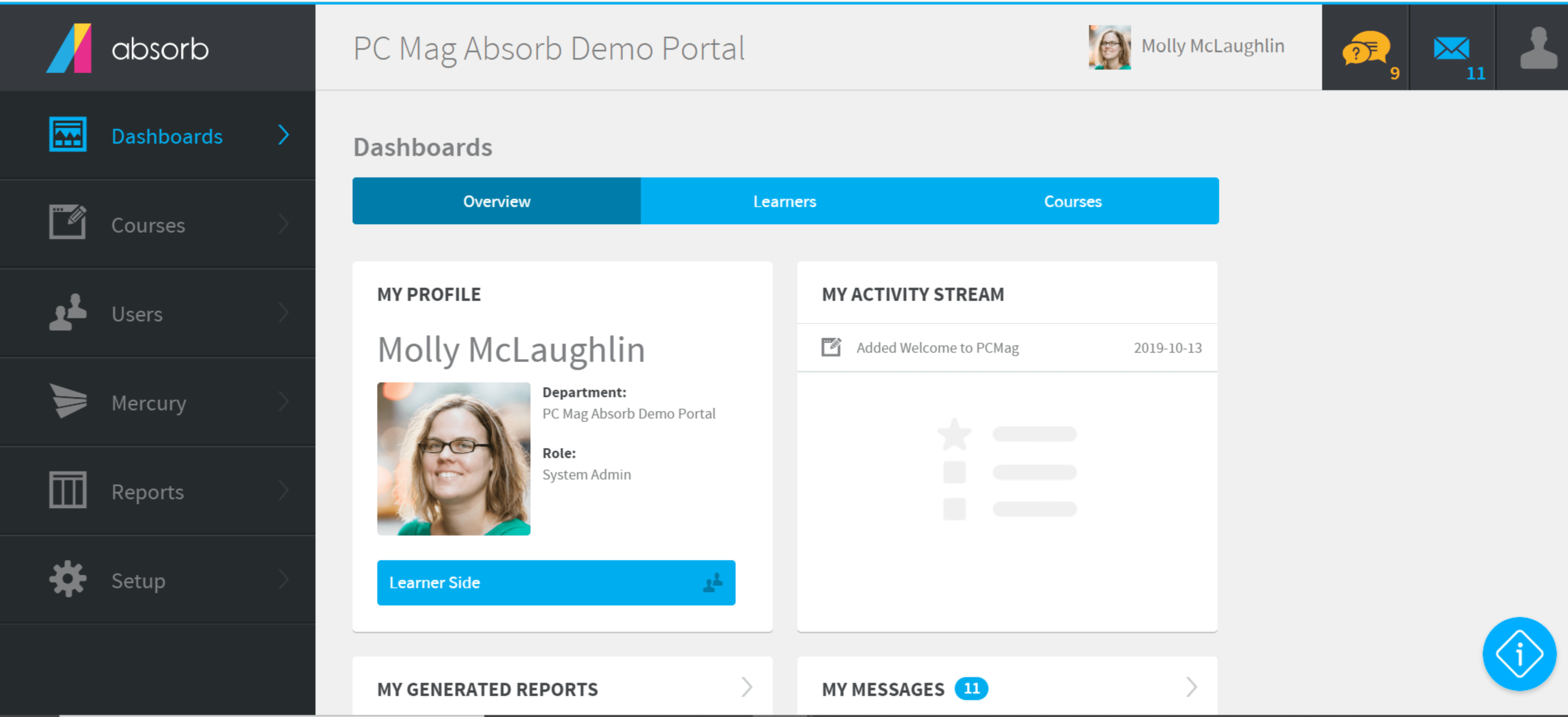
If you’re looking for an LMS that’s powerful yet doesn’t feel overwhelming, Absorb LMS is the one. It’s like the personal assistant you never knew you needed—it’s AI-powered, making training more efficient for employees, customers, and partners alike.
Whether you’re onboarding a new team member or upskilling a whole department, Absorb has you covered with personalized learning paths and streamlined admin tasks. Its user-friendly interface and adaptable pricing make it surprisingly accessible—even for lean L&D teams.
Best For: Complex training needs
Key Features
- Personalized learning paths
- AI automation
- Content library with expert-created courses
- E-commerce support
- Integrations with HRIS and third-party apps
Pros
- Customizable user experience that aligns with your brand
- Built-in AI for simplifying content creation and learner management
- Scalable for both internal and external training
- Automated reporting to save time
- Seamless integration with your existing tools
Cons
- The platform’s look and feel appear dated
- Some tasks must be done according to Absorb’s internal logic
- Lacks support for structured long-form assignments or plagiarism checks
- Doesn’t track offline training effectively
User Rating: 4.5 (Capterra)
User Review
“Absorb is ideal for our growing company—training delivery feels smooth, and the reporting tools give us the oversight we need across multiple teams.”
Pricing: Custom pricing based on number of learners, internal vs. external use, and required modules. Typically includes course builder, assessments, and basic analytics at base level. Free demo available on request
Scalability:
- Excellent for fast-growing businesses with complex needs or multiple audiences.
- Modules can be added as you grow—without overhauling the system.
3. Moodle
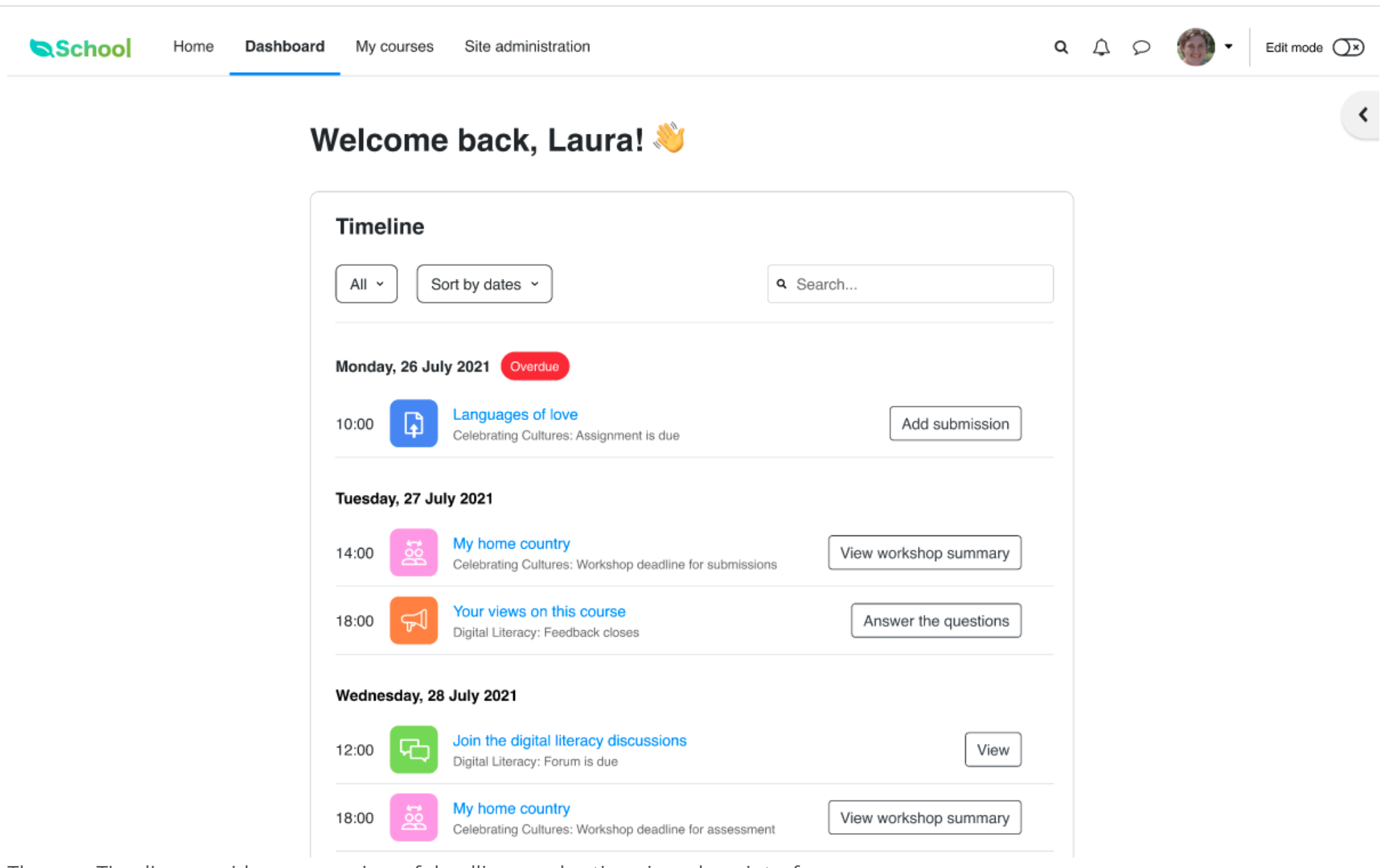
Moodle might be a perfect fit if you’re running a small business on a budget. With its free open-source model, it gives you a lot of flexibility to build your courses.
That said, the open-source version doesn’t come with support or managed hosting. If you’re not tech-savvy, you’ll need to invest time or hire help to get things running. For most small teams, MoodleCloud—their cloud-hosted solution—is a more practical way to get started quickly, without setting up your own servers.
Best For: Open-source flexibility
Key Features
- Seamless course creation with an easy-to-use interface
- Highly customizable to match your branding and training needs
- Mobile-friendly, offering learning access on the go
- Integrates well with third-party tools like Google Drive and Dropbox
- Offers automated notifications to keep learners engaged and informed
Pros
- Free open-source model makes it cost-effective for small businesses
- Supports a wide range of multimedia formats for course content
- Large community of users for support and sharing resources
- Scalable, allowing you to expand as your business grows
- User-friendly interface that doesn’t require advanced tech skills
Cons
- Moodle’s customizability has a steep learning curve, requiring technical expertise
- Being open-source, it requires resources for hosting, security, and updates
- The user interface feels outdated, making navigation more difficult
- Moodle can struggle with performance in large institutions or complex courses
User Rating: 4.3 (Capterra)
User Review
“Moodle offers incredible flexibility, but you’ll need to either have tech expertise or hire someone who does. Once set up, though, it’s solid.”
Pricing: Free open-source version (self-hosted)
MoodleCloud Plans:
- Starter: $130/year (50 users)
- Mini: $220/year (100 users)
- Medium: $920/year (500 users)
- Standard: $1,730/year (750 users + custom domain)
Scalability:
- From 50 to 750+ users; flexible for educators, consultants, and internal business teams
- Budget-Friendly Entry Point via free open-source version
- Free trial for MoodleCloud plans
4. Docebo
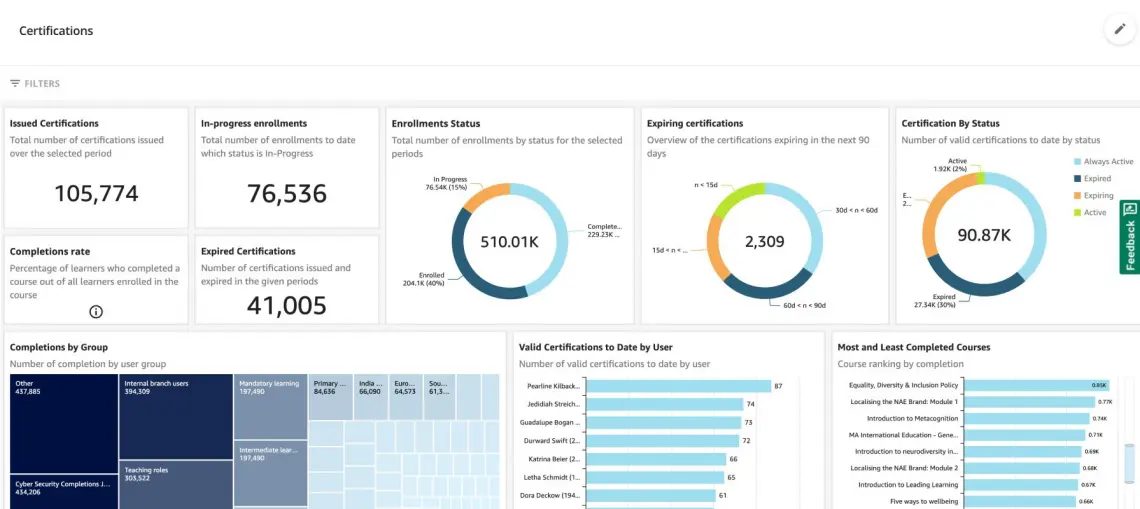
Docebo is often seen as an enterprise-grade LMS, but their Engage plan makes it a compelling choice for small businesses that are preparing to scale. If you’re serious about long-term training growth and want features like automation, blended learning, and gamification from the get-go, Docebo delivers.
Its strength lies in its AI-powered engine that personalizes content, automates workflows, and adapts to learner behaviors. And when you’re ready to scale into Elevate or Enterprise plans, you don’t need to switch platforms—you simply unlock new capabilities.
Best For: Scalable enterprise learning
Key Features
- High-performance AI for tagging and content suggestions
- Social and collaborative learning environment
- Workflow automation for repetitive tasks
- Branded mobile app and flexible user roles
- Gamification and compliance-ready assessments
Pros
- Automates repetitive admin tasks like enrollments and recertifications
- Powerful personalization engine adapts learning paths to individual needs
- Seamless workflow engine and version control
- Wide selection of learning resources and curated content
- Grows with your business via modular plans
Cons
- Could improve tracking for offline training and certifications
- Navigation and UI could feel clunky in parts
- Webinar features less smooth than Zoom/Teams
- Learning curve for new admins
User Rating: 4.4 (Capterra)
User Review
“Docebo gives us everything we need to scale training globally. The automation features alone have saved us hundreds of hours, though the admin interface takes some getting used to.”
Pricing: Pricing is custom quote-based. Free demo available. There are three tiers:
- Engage: Ideal for growing teams (includes gamification, blended learning, basic automation)
- Elevate: Adds AI content, skills tracking, workflow automation
- Enterprise: Full-scale analytics, branded mobile apps, enterprise integrations
Scalability:
- Built to grow with you.
- Start lean, expand without switching platforms.
5. iSpring Learn
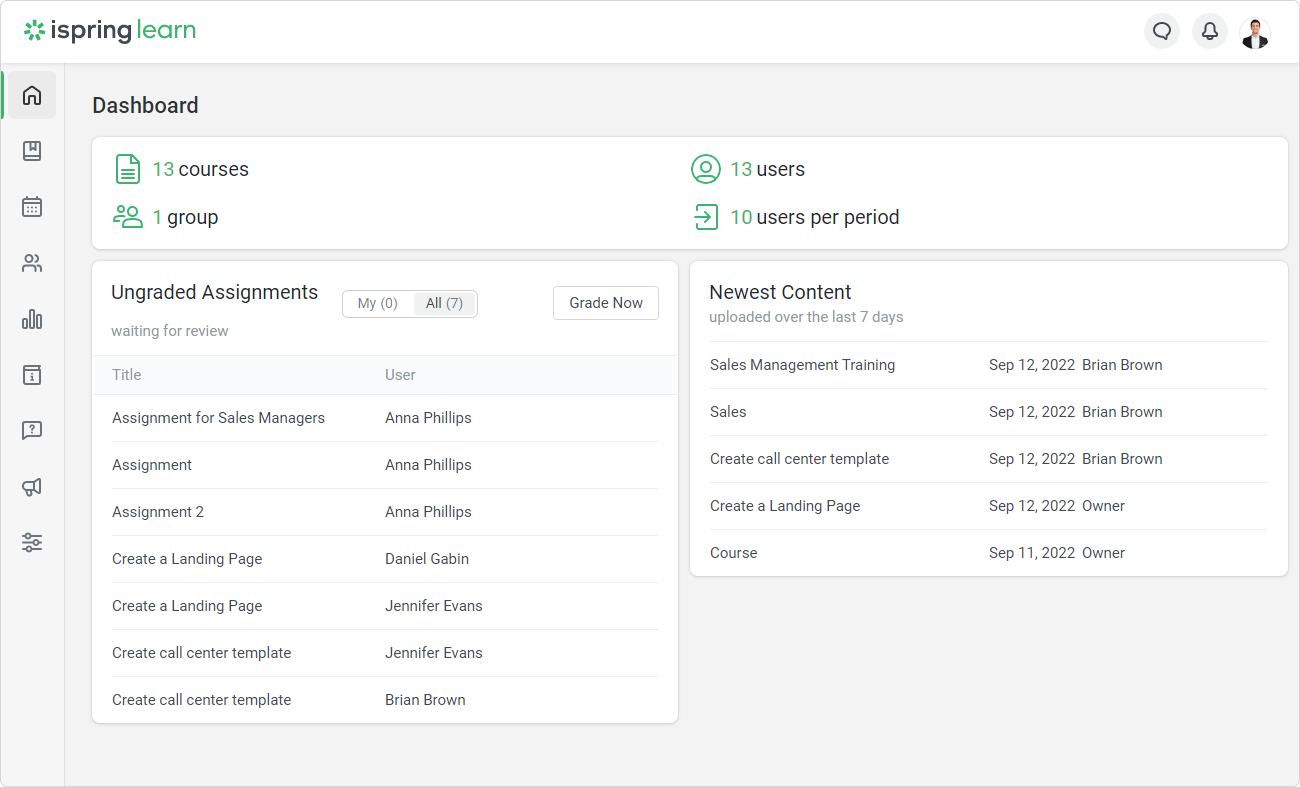
iSpring Learn is like your trusty sidekick when it comes to employee training, especially for small businesses. It’s super simple to use and doesn’t have the complexity of larger enterprise platforms, making it perfect for teams that need to onboard, upskill, and certify without the fuss.
Whether your employees are in the office, at home, or on the go, they can access training from any device, even offline! So, whether on a plane or at a café with no Wi-Fi, they can still knock out their learning.
The cool part? This learning management system for small business comes with ready-made courses from the iSpring Academy, saving you tons of time and money on content creation. You can focus more on running your business while it takes care of the training part. Plus, the pricing is pretty straightforward with a free trial, so you can test it before fully committing.
Best For: eLearning & certification
Key Features
- All SCORM 1.2 and SCORM 2004 content is fully compatible, whether created with iSpring Suite or external tools
- Create structured learning tracks with step-by-step courses
- It has a free app for both iOS and Android that lets learners access and complete courses offline
- Allows you to create custom reports to track learner progress and performance exactly how you want it
- Enables you to customize the admin and user portals to match your company’s look and feel
Pros
- Upload as much content as you need with no file size limits
- Collect feedback and offer comprehensive insights into strengths and areas for growth
- Personalize the LMS with your company’s colors and logo
- It integrates with Zoom, making it easy to plan and host live webinars and automatically track engagement and attendance
- Set up rules that automatically assign training materials to employees based on specific criteria
Cons
- Limiting functionality like copy and paste in tests may hinder flexibility
- Lack of integration with AI tools for automatic quiz generation, interactive scenarios, and learning path creation
- The lack of features, such as comments and version control, can slow down the course creation process
- The lead administrator cannot access the dashboards that managers can see for their teams
User Rating: 4.6 (G2)
User Review
“iSpring has been a huge time-saver. The offline access feature is a blessing for our remote teams, and their templates make course creation easy—even for beginners.”
Pricing:
- Start Plan: $3.70/user/month (billed annually) – mobile app, content management, 50 GB storage
- Business Plan: $4.10/user/month – adds unlimited storage, advanced analytics, 360-degree performance appraisals, and custom roles
- Free trial available
Scalability:
- Affordable pricing scales predictably with active users.
- Great for businesses with remote or mobile-first teams.
6. 360Learning
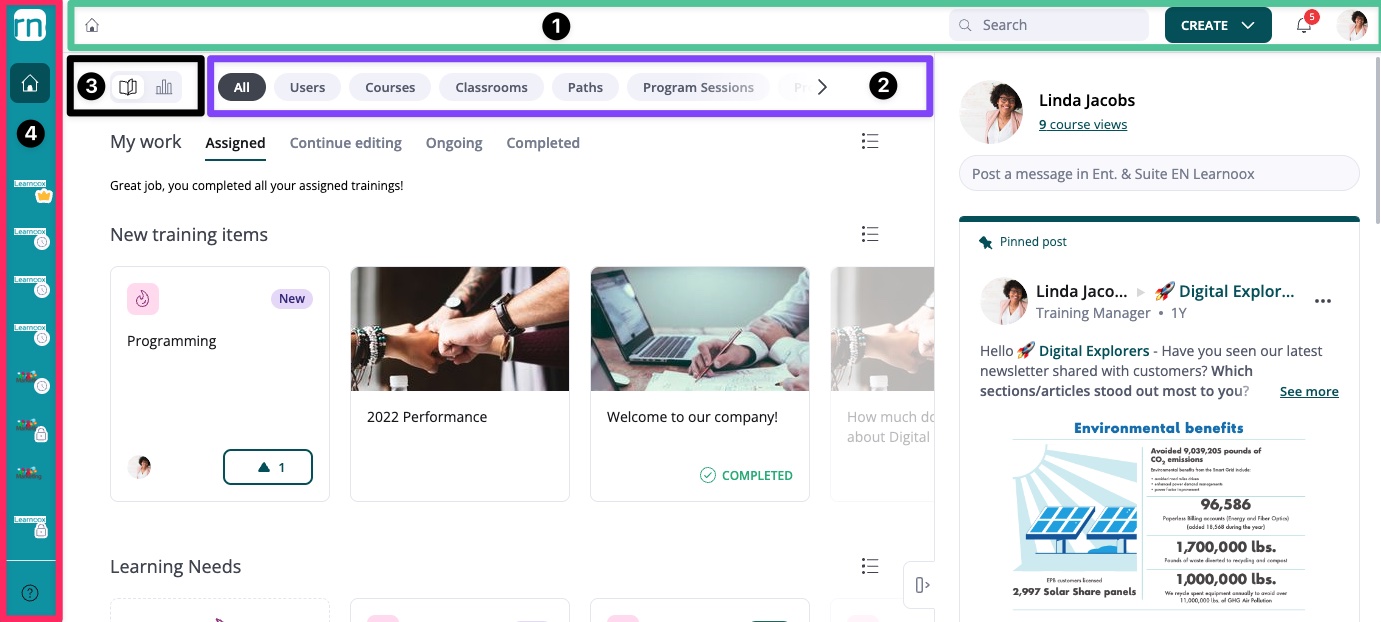
360Learning turns corporate training into a team sport. No more dull, top-down courses—this platform makes learning interactive and peer-driven. Employees create and share training, turning internal expertise into engaging content.
For fast-moving teams, 360Learning streamlines onboarding, upskilling, and compliance training. AI-driven tools help identify knowledge gaps, while social learning features keep teams engaged.
What makes it stand out? Built-in collaboration tools, real-time feedback, and automation that cuts course creation time in half. Companies like Toyota and Aircall trust it to keep their workforce ahead.
Best For: Collaborative learning
Key Features
- You can build an entire website for your courses with no coding needed
- Drip content lets you release lessons on a schedule to keep students engaged
- Quizzes and surveys help you track student progress and gather feedback
- Payment integrations make it easy to sell courses and accept payments globally
- Membership options let you create subscription-based courses or communities
Pros
- Super easy to use with a clean, intuitive interface
- Offers excellent flexibility in customizing your course site
- Handles payments smoothly, including subscriptions and memberships
- The free plan gives you access to many features to get started
- Strong community and customer support to guide you through
Cons
- The search system only looks at course titles, not the content inside
- No easy way to group courses; a folder system for subjects would help
- Lacks an AI chatbot for smarter course searching, relying on a basic search bar
- No language settings on the login page for users to select their preferred language upfront
User Rating: 4.6 (G2)
User Review
“360Learning has turned our internal experts into course creators. The peer feedback and collaboration tools make training feel less like a chore and more like teamwork.”
Pricing:
- Team Plan: $8/user/month (up to 100 users) – includes essential tools
- Business Plan: Custom pricing for larger teams or added integrations
- Free trial available
Scalability:
- Excellent for small businesses that want to unlock internal knowledge and scale fast through collaboration.
- Easily grows from 10 to 1,000+ users.
7. LearnUpon
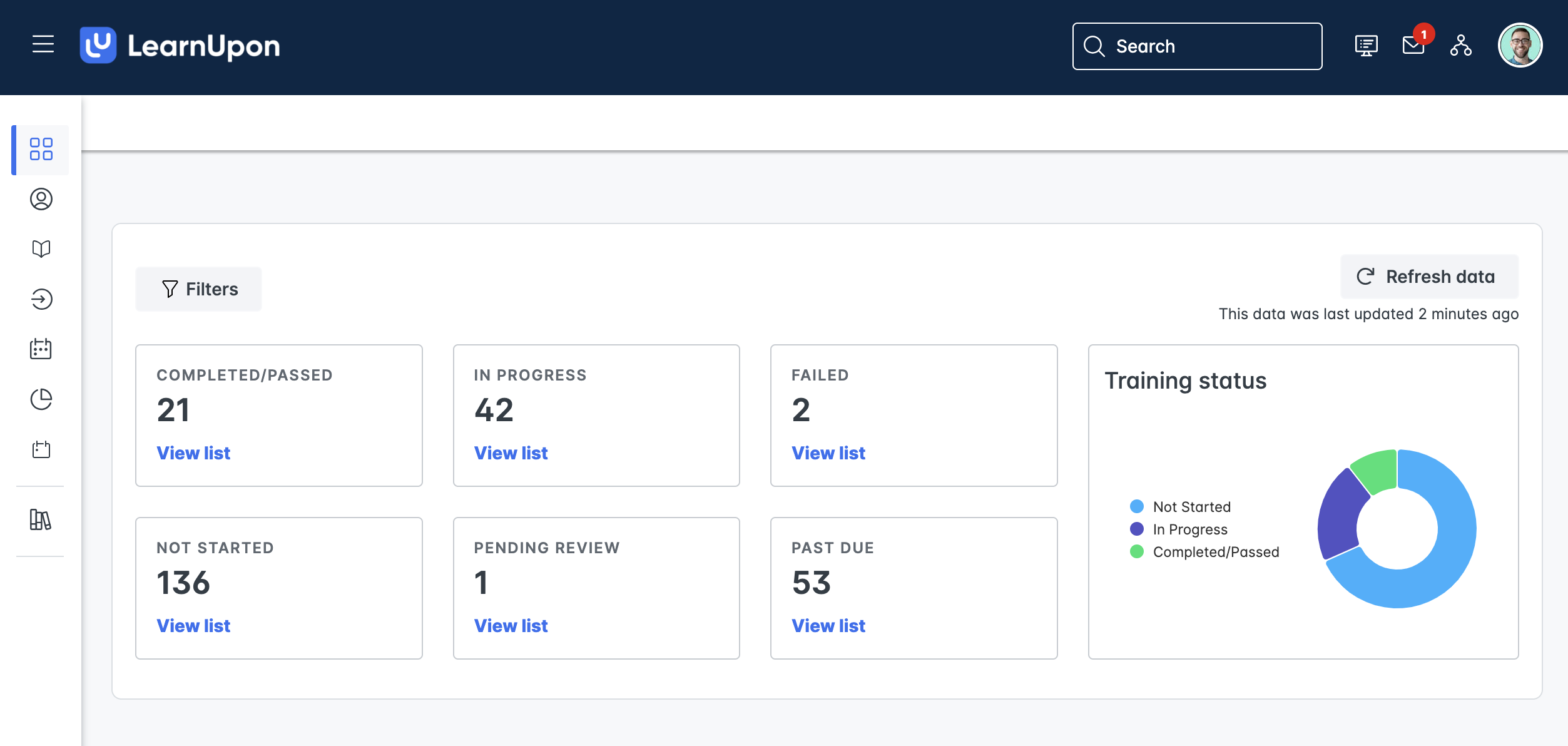
Next on my list for small businesses is LearnUpon—a fantastic choice if you’re ready to step up your training game. Their Engage plan is perfect for small teams looking to simplify and centralize learning without getting bogged down in complexity.
What makes LearnUpon stand out? It supports SCORM and xAPI, so you can easily import and track diverse content. The custom branding options let you make the platform truly yours, and the gamification features keep your learners motivated and involved. Plus, if you’re running live sessions or webinars, the seamless integrations make it a breeze to manage everything in one place.
Best For: Corporate L&D teams
Key Features
- AI-powered learning automates tasks and creates personalized learning experiences with AI-driven tools
- You can create portals for diverse audiences to manage separate learning environments
- Engage learners with badges, points, and leaderboards for a more interactive experience
- Connect seamlessly with tools like Salesforce, Zoom, and Slack for smooth operations
- Offer training in over 20 languages, making global learning accessible and effective
Pros
- Easy to centralize and manage all learning in one platform
- Engaging and interactive learning experience keeps teams motivated
- Flexible for different audiences—employees, customers, or partners
- Strong reporting tools to track progress and measure impact
- Excellent customer support with personalized strategies for success
Cons
- The platform layout lacks intuitive navigation, as users must click through multiple pages without clear labels or page counts
- Archived courses stay visible in the courses subpage, which adds unnecessary clutter and confusion
- The platform offers restricting course formats to basic headings, text, videos, and quizzes
- The platform shows slow development with minimally noticeable updates
User Rating: 4.6 (G2)
User Review
“We use LearnUpon to manage internal and partner training. It’s flexible, scalable, and their customer support really goes the extra mile.”
Pricing: There are three pricing tiers:
- Essential: Up to 150 users – core features, SCORM support, gamification
- Premium: 150–500 users – adds integrations, multilingual support
- Enterprise: 500+ users – includes white labeling, Salesforce integration
All plans include onboarding & 24/7 support. Free demo available
Scalability:
- Designed for growth.
- Offers tiered plans that expand without overcomplicating your setup.
8. Braincert
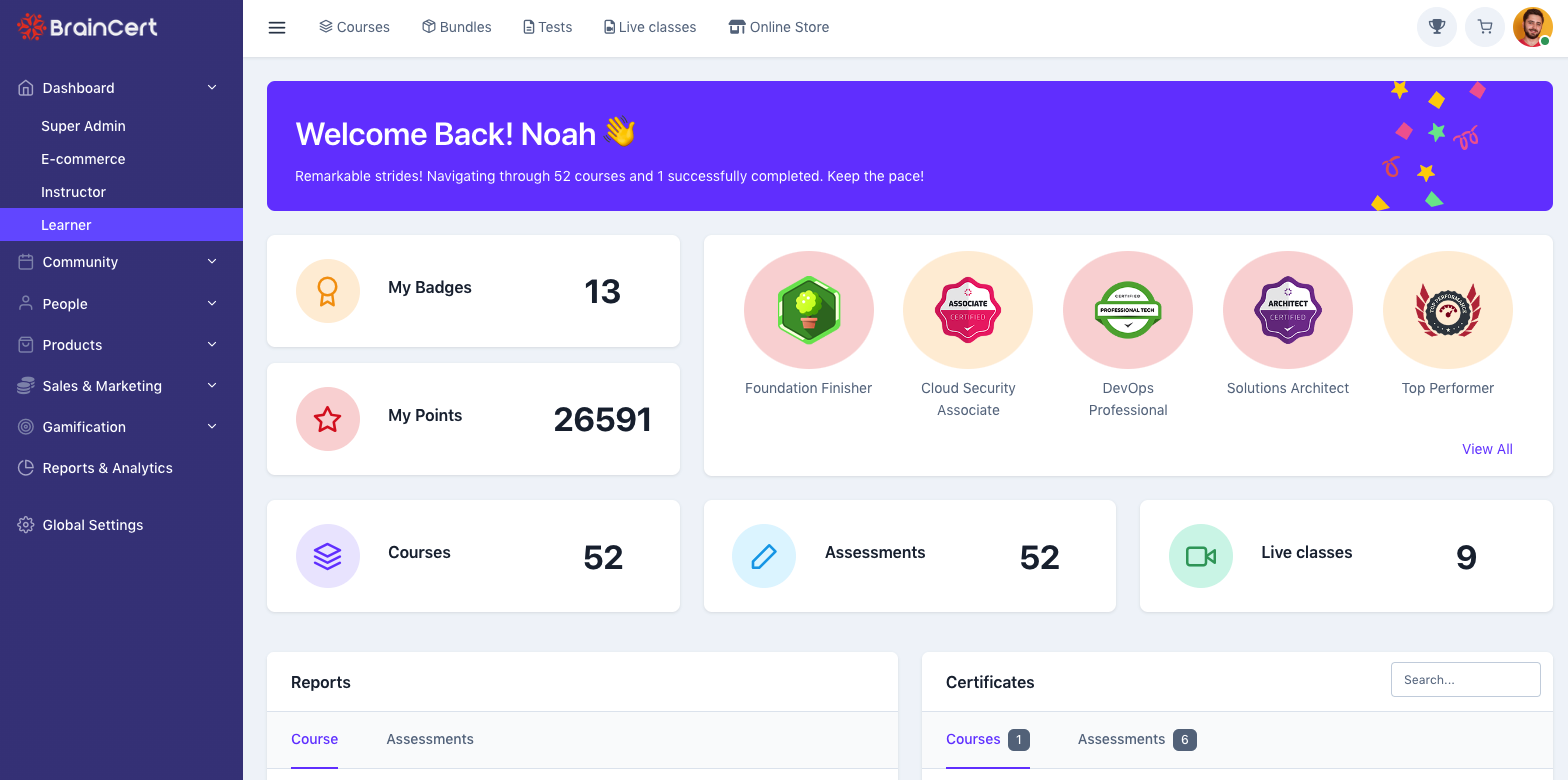
Next up is BrainCert, an all-in-one learning platform that seamlessly blends content creation, marketing, and sales. It’s perfect for businesses looking to bring their training programs to life with immersive, interactive learning experiences.
BrainCert offers everything from course creation to assessments and live collaboration tools, making it a great choice for organizations eager to simplify their eLearning approach.
So, what makes BrainCert shine? Their platform is designed for true collaboration, with built-in virtual classrooms and real-time interactions to foster a more engaging learning environment. Their advanced gamification engine keeps learners motivated through rewards and leaderboards.
Best For: Gamified training & course sales
Key Features
- Built-in virtual classrooms for live, interactive learning experiences
- AI/ML-powered analytics for data-driven insights into learner progress
- Comprehensive eCommerce capabilities to sell courses, tests, and more
- Integrated marketing automation tools for smooth promotion and outreach
- Global reach with advanced WebRTC for seamless, low-latency connections worldwide
Pros
- Centralized platform for everything from course creation to learner engagement
- Highly customizable to match your brand with tailored visuals and SSL certificates
- Real-time collaboration tools enhance team learning experiences
- Wide range of integrations with apps like PayPal, Stripe, and Dropbox to support business needs
- Reliable 24/7 support to help you overcome any challenges quickly
Cons
- API access does not provide detailed session chat logs, which could improve tracking and reporting
- The “Important Notes” feature is not available for attendees to download
- There’s no rating feature for sessions, which could provide valuable feedback to instructors
- The screen-share feature in the virtual classroom is not available
User Rating: 4.3 (Capterra)
User Review
“BrainCert gives us everything we need in one place—LMS, ecommerce, virtual classrooms. We’ve doubled our learner engagement with its gamification features.”
Pricing: There are three pricing tiers:
- Pro: $49/year – up to 20 products, free assessments, 2 admins
- Elite: $119/year – 40 products, SCORM files, 1,000 learners
- Growth: $239/year – unlimited SCORM, 2,500 learners, 10,000 classroom minutes
*No transaction fees, ideal for course sellers
Scalability:
- Affordable for solopreneurs and teams alike.
- Flexible pricing supports thousands of learners as your training grows.
9. SkyPrep
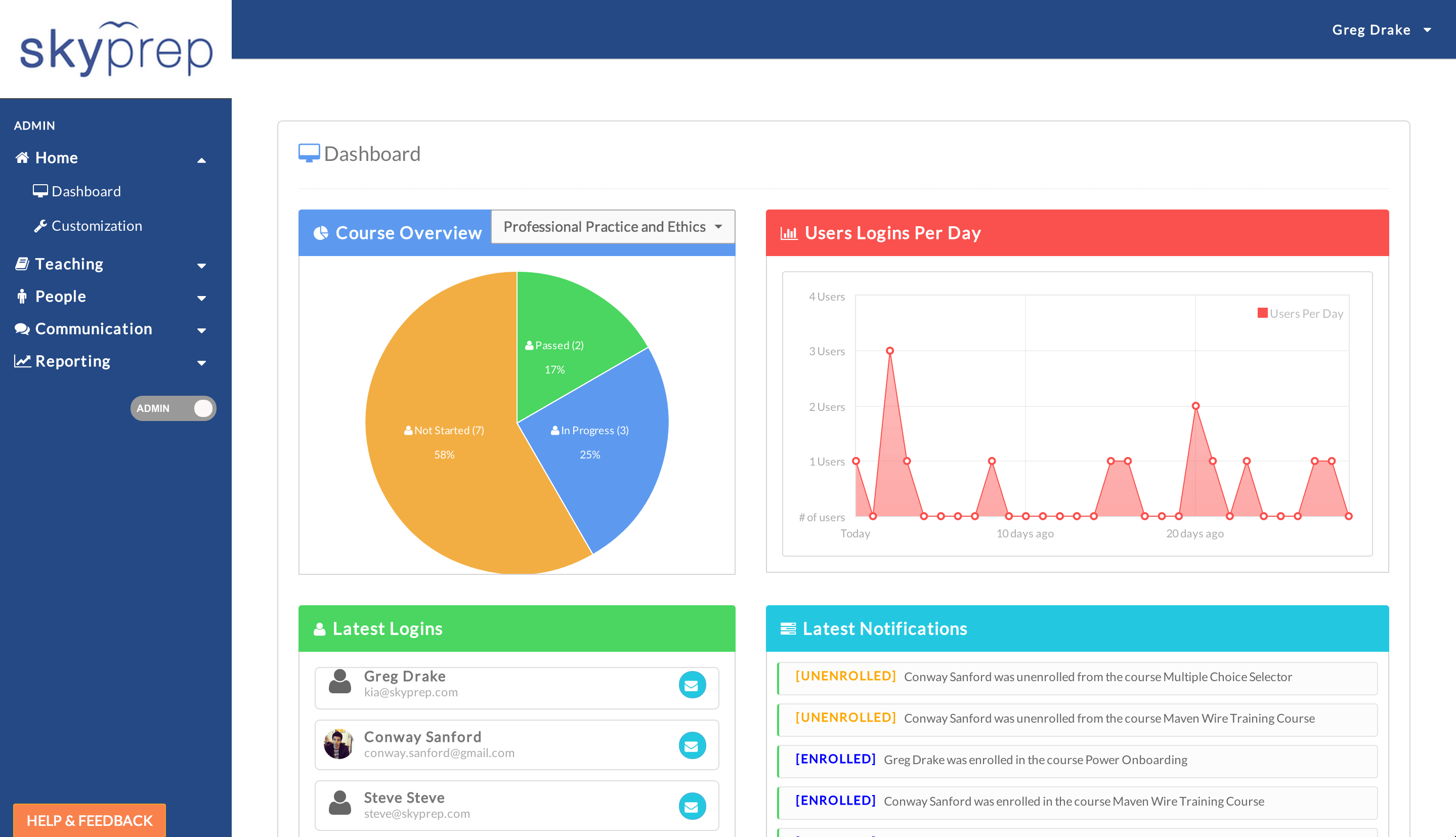
SkyPrep is one of the leading LMS system solutions for small businesses looking to simplify training. It helps you create, manage, and track training for your team, customers, or partners. With cool features like AI-powered learning, automated workflows, and integrations with tools like Zoom and ADP, it’s designed to save you time.
You can customize the platform to match your brand, whether you’re using it for one team or multiple. Security is top-notch, so you don’t have to worry about your data. Plus, there’s a mobile app, SCORM compliance, and even e-commerce options to make your training accessible anywhere. Still unsure? No problem—SkyPrep offers a free demo to help you decide if it fits your business correctly.
Best For: Online employee development
Key Features
- SkyPrep simplifies course creation with tools like assessments, checklists, and knowledge checks
- Integrates with popular tools like Zoom, ADP, and Google
- Supports multi-tenant functionality that helps separate platforms for different clients or branches
- Comes with an AI-powered assistant to enhance the learning experience
- Provides detailed reporting and analytics, helping you measure training impact
Pros
- Automates user management, reducing the need for manual data entry
- Offers personalized branding so you can tailor the platform to match your company’s look
- Engages learners through gamification and an interactive platform
- Lets you automate tasks like course enrollment and notifications
- Features enterprise-grade security, ensuring your data is safe
Cons
- Navigation between user details is slightly tricky as it currently requires returning to the user list instead of directly moving to the next user
- It’s hard to see whether a knowledge booster was sent, which can confuse tracking
- The guidelines around auto-enrollment functions could be clarified, as it might be confusing at first glance
- Building custom certificates is a bit more complicated than expected
User Rating: 4.6 (G2)
User Review
“SkyPrep checks all the boxes for us—automation, branding, analytics. Our training feels modern and manageable, even with limited internal resources.”
Pricing: All plans use tiered pricing; demo available on request
- Lite Plan – core LMS features, essential reporting
- Premium Plan – adds gamification, custom branding, integrations
- Enterprise Plan – tailored for larger orgs with multi-site needs
Scalability:
- Ideal for growing teams and multi-client setups.
- Easily expands with your org structure and supports automation at scale.
10. SAP Litmos
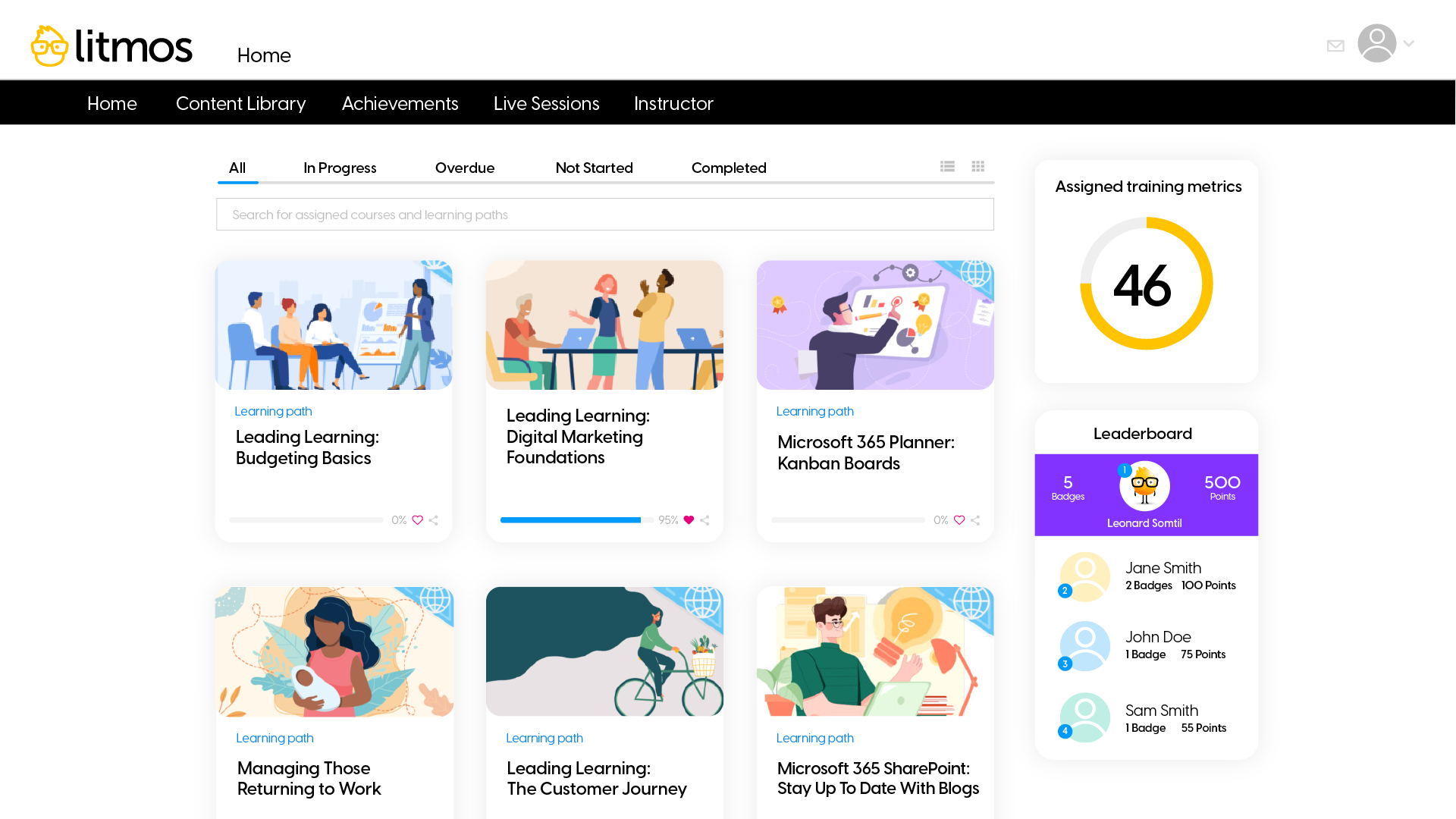
Litmos is a fantastic tool for small businesses to streamline their training processes without the headache of creating everything from scratch. With its robust, off-the-shelf training content library, businesses can access a wide range of courses for compliance, soft skills, and more right out of the box.
Litmos offers over 98,000 ready-made online courses, including 140 Foundation Courses, 1,600+ Soft Skills courses, and a wide range of compliance courses.
It’s super simple to set up, and with the help of its AI tools, you can automate parts of your training so that you spend less time managing and more time focusing on growing your business. Plus, the platform’s flexibility means you can scale as you go—perfect for small businesses looking to grow smartly.
Best For: Off-the-shelf course libraries
Key Features
- AI Playlists that curate content based on learner preferences and progress
- Integrations with various third-party apps for seamless workflows
- Gamification options to make learning fun and rewarding
- Instructor-Led Training (ILT/vILT) for a blended learning experience
- Mobile learning capabilities, so your team can access training anytime, anywhere
Pros
- The platform is user-friendly and allows admins and learners to interact easily with the content
- Litmos offers a wide variety of pre-built courses that cover everything from compliance to soft skills
- The platform integrates well with other tools, saving time and ensuring workflow continuity
- Litmos adapts to businesses of all sizes and offers scalable solutions
- Detailed reporting features provide insights to measure effectiveness and inform decisions
Cons
- It would be helpful if custom reports could be shared directly with other users within the system
- Building courses could be more efficient, especially when packaging content into class and course packets
- Writing effectively within the various memory blocks can be challenging, and there does not seem to be a built-in spell checker that ensures accuracy
- The window for editing copy is relatively small and makes it difficult to manage larger amounts of content
User Rating: 4.2 (Capterra)
User Review
“We didn’t have time to create content from scratch. Litmos gave us a full course library from day one, and our team was up and running in no time.”
Pricing: Custom pricing; each suite can be bundled or purchased separately
- Foundation AI Suite – basic AI LMS tools + 140 starter courses (for teams <100 learners)
- Premier AI Suite – premier AI LMS, adds content authoring, more compliance libraries
- Platinum AI Suite – includes AI tools, advanced analytics, and 2,800+ courses
Scalability: Ideal for small teams with growing compliance or training needs. Expands content access and features without rebuilding infrastructure.
Why Small Businesses Need an LMS
As a small business, you might wonder:
“How do I train my team without pulling my hair out?”
“How can I ensure everyone is on the same page without spending hours repeating myself?”
Here’s the reality: without a central system, training often ends up fragmented—documents here, videos there, endless one-on-one calls, and no consistent tracking. That leads to wasted time, lost productivity, and missed growth opportunities.
An LMS helps fix that. It brings all your training under one roof so you can stop improvising and start building repeatable, scalable systems that support your team, whether onboarding new hires, launching compliance programs, or preparing to scale.
Let’s see how:
Consistent Training: Ensure all learners receive standardized, uniform content and instruction and minimize variations in knowledge delivery.
Easy Tracking: Track employee progress and measure knowledge retention effortlessly to ensure everyone is on the same page.
Scalable Training: Easily scale programs to accommodate additional employees or training materials.
Improved Knowledge Sharing: Capture and share valuable knowledge from experienced staff in a central location.
Centralized Resources: Maintain and update training materials in one central hub as it ensures that everyone has access to the latest information.
Increased Compliance: Ensure employees are up-to-date on compliance requirements by easily tracking completions and certifications.
Reduced Costs: Save time and money on training materials, logistics, venues, and delivery by digitizing resources and eliminating the need for physical resources.
Look at how KDD transformed their employee training with ProProfs Training Maker, significantly reducing costs.
Core Use Cases That Matter Most
An LMS isn’t just for L&D teams—it’s a practical solution for:
Employee onboarding – Get new hires productive faster with consistent training paths. Tools like ProProfs Training Maker even let you preload courses by role—so whether you’re hiring one person or five, the experience is consistent.
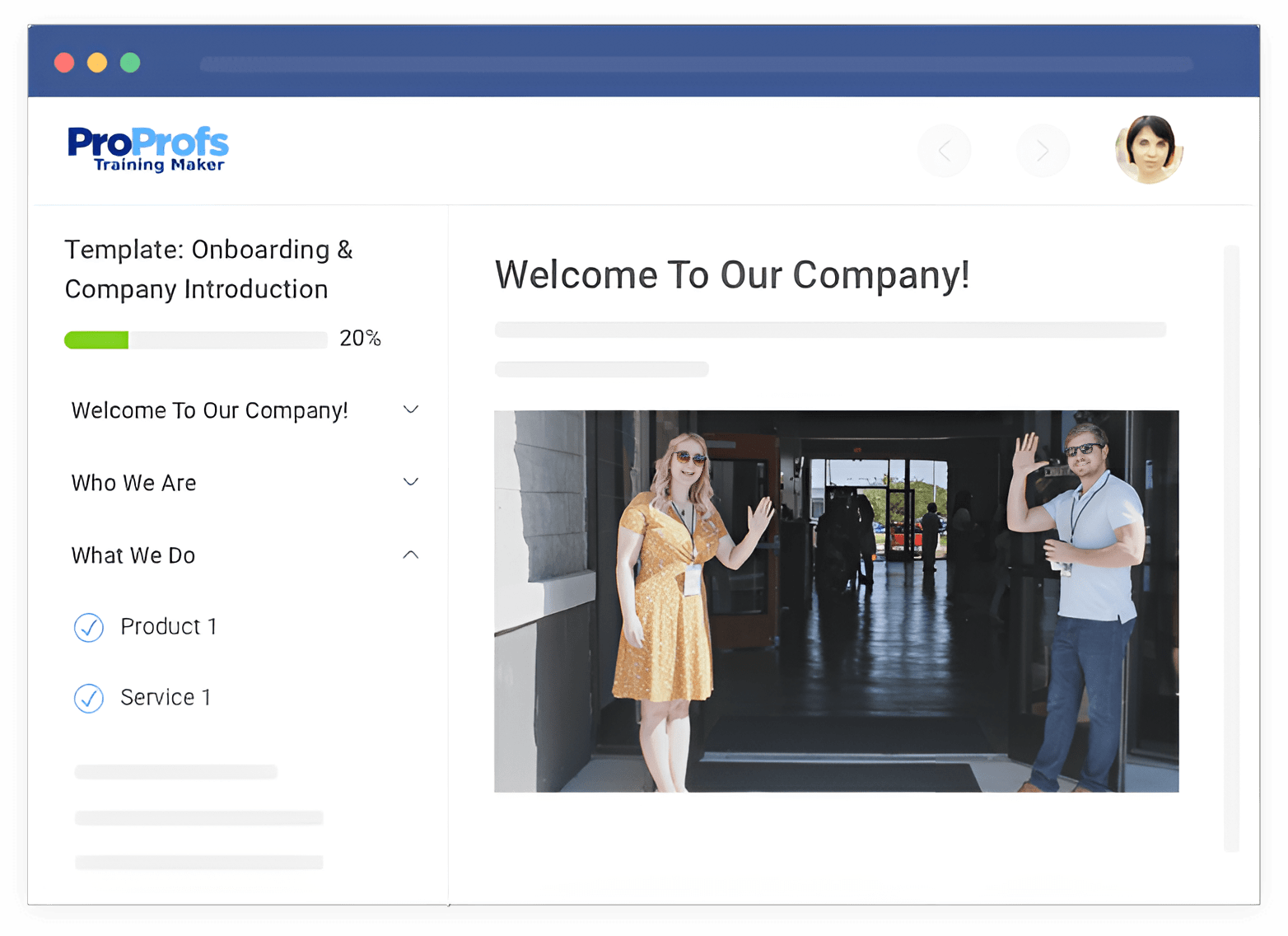
Compliance & certification – Upskill teams as your product or services evolve. Training for OSHA, HIPAA, workplace safety, or anti-harassment isn’t optional. But managing completions through spreadsheets and email follow-ups is exhausting—and risky. For example, ProProfs Training Maker offers 200+ plug-and-play courses you can launch as-is or customize in minutes.
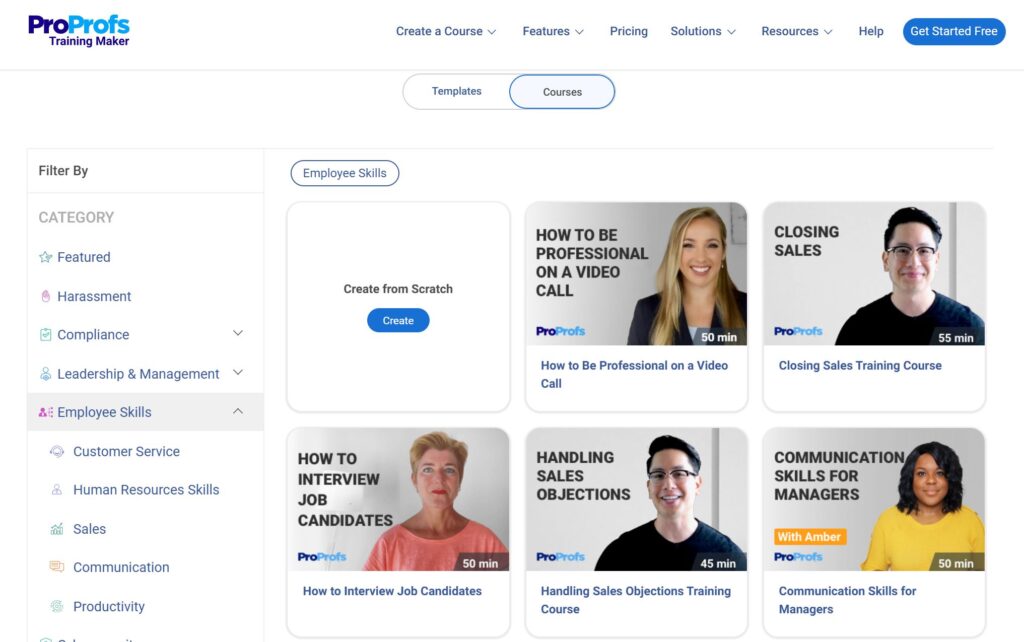
Remote & hybrid enablement – Deliver training regardless of where employees work. A cloud-based LMS ensures your team can learn from anywhere, on any device. And you’ll still get real-time progress reports without chasing anyone down.
Extended training – Growth shouldn’t mean more admin overhead. A good LMS grows with you. Assign training by job title, department, or location. Automate course enrollment. Let managers see dashboards for their own teams. Educate partners, clients, or franchise locations at scale.
Pro Tip:
You don’t need to hire a full-time trainer or build elaborate training videos. You just need a system that helps you deliver the right knowledge, to the right people, at the right time—without burning out.
And if you’re using an LMS designed specifically for small businesses—like ProProfs Training Maker—you get exactly that. No bloat. No confusion. Just a smarter way to train.
Key Features of LMS for Small Businesses
All the benefits mentioned above don’t happen by chance—they result from the powerful features packed into modern LMS systems for small business.
Here are the key features to look for if you want your LMS to save time, increase consistency, and scale with your team:
1. Course Management
- Easily create, upload, and organize training materials
- Supports multiple formats: videos, quizzes, PDFs, slides, SCORM
- Ideal for delivering self-paced onboarding, product training, and SOPs
ProProfs Training Maker simplifies this with drag-and-drop tools, 200+ templates, and AI-assisted course creation.
2. Progress Tracking & Reporting
- Real-time insights into learner activity
- Track completions, quiz scores, time spent, and more
- Useful for identifying skill gaps and reporting to leadership or regulators
3. Mobile-Friendly Access
- Learners can access content from phones, tablets, or laptops
- Supports remote teams, field workers, and hybrid setups
- Enables learning during downtime without disrupting workflow
ProProfs offers mobile-ready courses with zero setup.
4. Automation & Reminders
- Auto-assign courses by role, team, or location
- Sends reminders for due dates, certifications, or retakes
- Reduces the need for manual follow-up
Especially helpful for scaling onboarding or compliance across locations. You can easily set calendar reminders on tools like Training Maker to ensure compliance.
5. Customization & Branding
- Brand the LMS with your company logo, colors, and custom domains
- Create unique learning paths based on roles or departments
- White-labeling available for external training or course monetization
ProProfs allows full white-labeling, branded certificates, and user-specific training journeys.
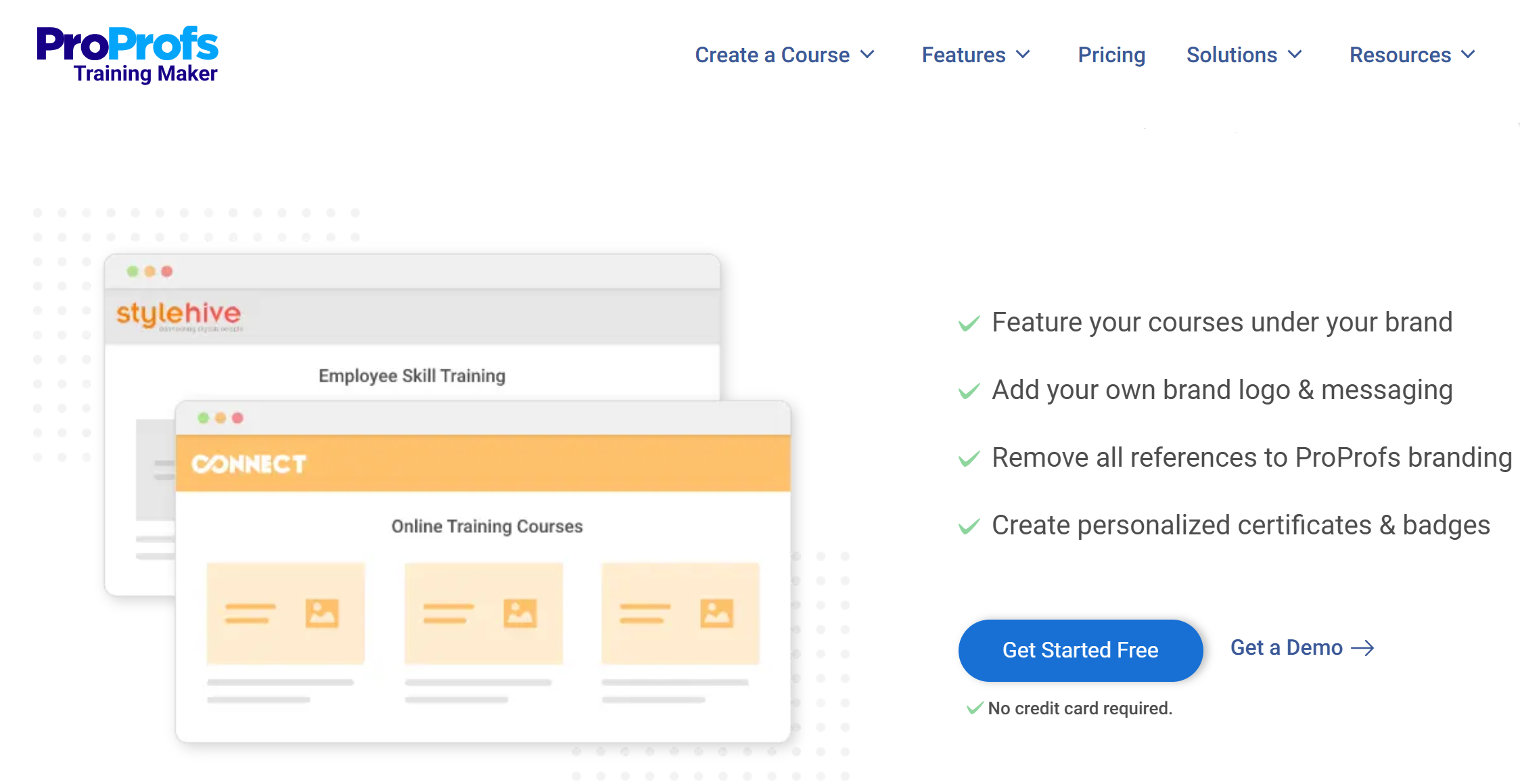
Watch this video to learn how to customize your online course with your own branding and logo.
7. Quizzes, Assessments & Feedback
- Add interactive quizzes, polls, and knowledge checks
- Collect learner feedback and course ratings
- Reinforces knowledge retention and identifies weak areas
- Great for tracking how well team members actually understand the material.
Watch this video on how to create an online assessment.
8. Certificates & Badges
- Automatically generate completion certificates
- Use gamification features like points and badges to boost motivation
- Store and track certifications for internal records or external audits
Helpful for industries with mandatory training cycles.

9. Security, Roles & Permissions
- Control who sees what: restrict admin, instructor, and learner access
- Ensure data privacy with role-based permissions
- Encrypted logins, audit logs, and GDPR compliance where needed
ProProfs supports secure access and is fully GDPR-compliant.
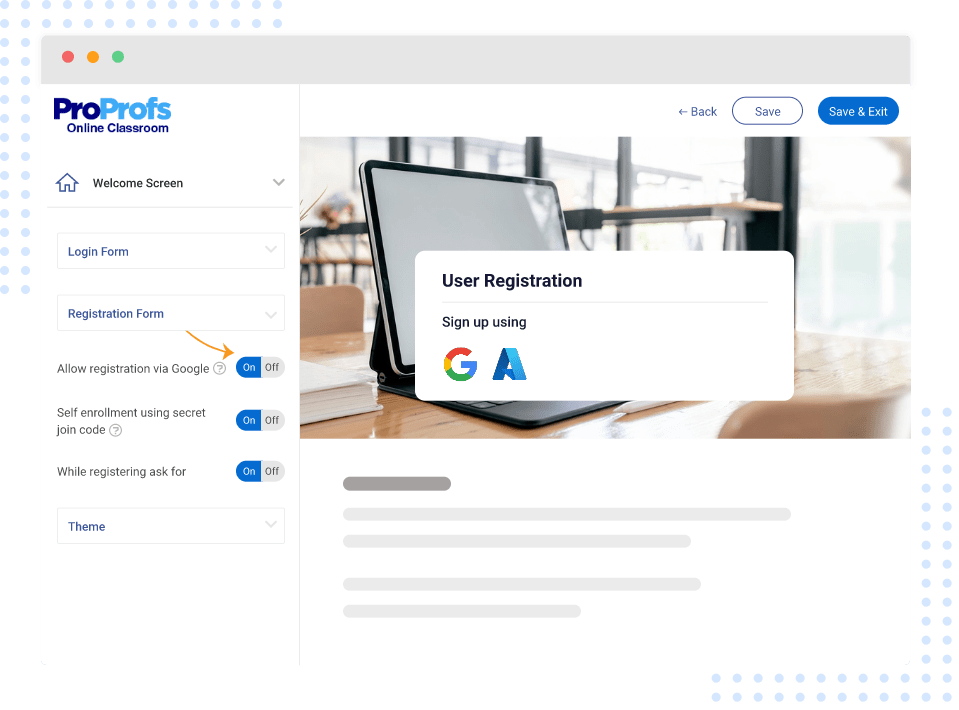
10. AI Support & Smart Insights (Often Overlooked)
- Recommend courses based on behavior or role
- Help automate quiz creation or course structuring
- Speed up content curation and delivery
ProProfs uses AI to create courses from URLs or documents in minutes.
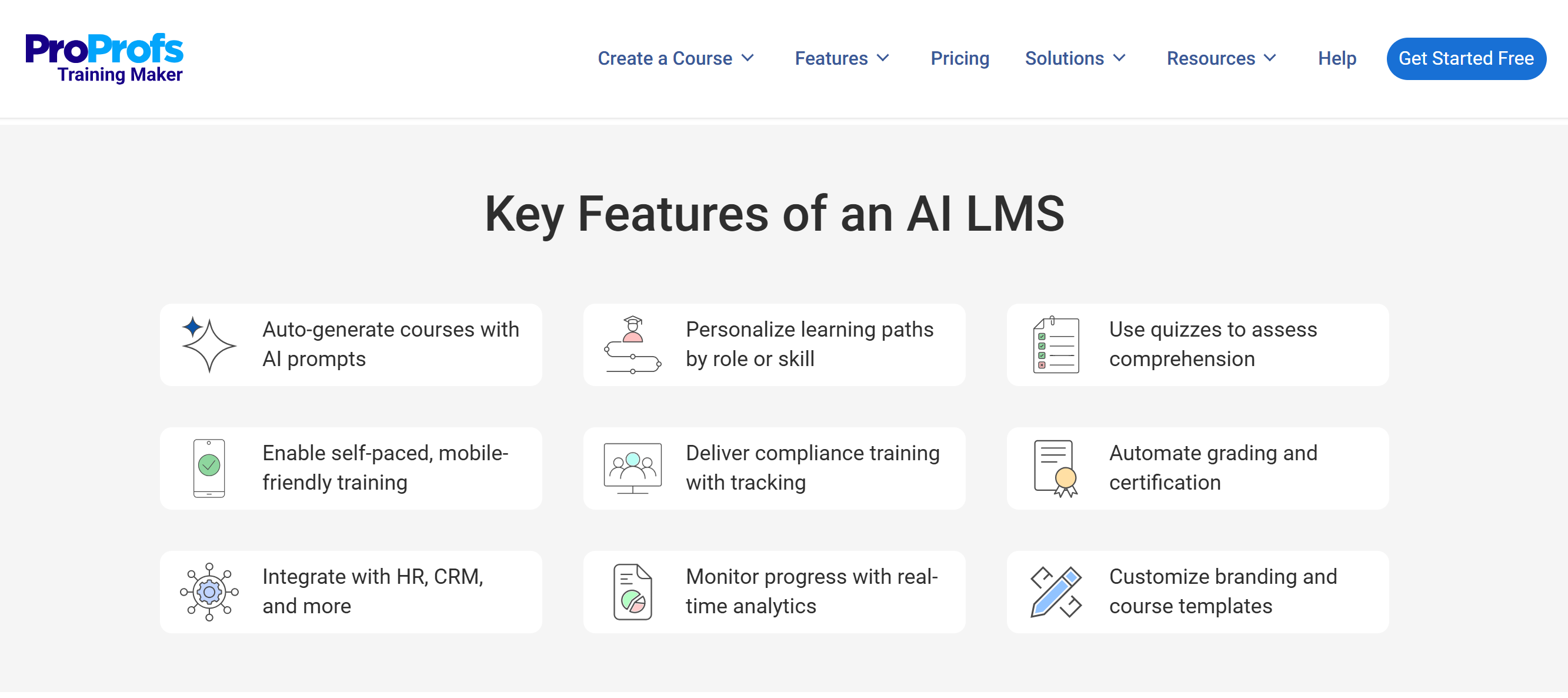
11. Integrations & Extensibility
- Connects with HR tools (e.g., BambooHR), CRMs (e.g., Salesforce), and communication tools (e.g., Zoom)
- Payment integration for course sellers (Stripe, PayPal)
- Supports external data sync and workflow automation
A connected LMS helps training fit into your existing stack, not live outside.

This isn’t about collecting features for their own sake. The best LMS platforms for small businesses focus on useful features that simplify your job, not overwhelm it. If the platform offers AI, templates, and automation, like ProProfs Training Maker, setup and scaling become frictionless.
How to Choose the Best LMS for Small Businesses
Not Every LMS Is Built for You—Here’s How to Find the One That Is.
Being in the industry for some time now, I’ve observed that small businesses often struggle to find the right LMS that fits their unique needs. Unlike large corporations, small businesses need an LMS that’s simple, cost-effective, and easy to manage without a big IT team.
So, how do you choose the best LMS for startups?
1. Start With Your Training Goals
Start by narrowing down what you actually need training for. If it’s onboarding, think about how many people join monthly and what content repeats. If it’s compliance, list out the certifications or deadlines you’re accountable for. Write these goals out clearly—this makes it easier to compare tools based on what they help you achieve rather than what they promise.
2. Look at Features That Match Your Workflow
Scan the feature list through that lens once you’re clear on your goals. If you’re constantly emailing PDFs or repeating Zoom walkthroughs, prioritize course automation and mobile access. You’ll need real-time progress reports and certificates if you’re doing compliance tracking.
The fastest way to do this: pick one training use case—like onboarding a sales rep—and walk through how you’d build and assign that training using the LMS. If the feature feels like friction, it’s not the right tool.
3. Prioritize Ease of Use
Most small teams don’t have the time or headcount to learn complicated software. Test the tool by actually building one course you’d deliver on day one. Add your content, assign it to a test user, and try tracking progress. If you get stuck or need help from support just to publish one lesson, that’s a red flag.
Ask a non-technical team member to try the same steps. If they can’t figure it out without guidance, adoption will be a challenge.
4. Understand the Pricing Model
Look beyond the headline pricing. Ask: Are you paying per user or per feature? What happens if you want to add a new manager or scale up to 50 users? Request a breakdown of what’s included in each plan.
As a rule of thumb, avoid LMS platforms for small business that require negotiation just to get a pricing PDF. Platforms like ProProfs, for example, offer visible, tier-based plans so you know what you’re signing up for before pulling out your credit card.
5. Evaluate the Quality of Support
Before committing, test the vendor’s support. Send a real question—something small, like “How do I assign the same course to multiple teams?” and see how fast they reply, and how clearly.
If they take days to respond or send canned replies, imagine what happens when you hit a real issue mid-rollout.
6. Always Try Before You Buy
A free trial shouldn’t be a guided tour—it should be your own test drive. Don’t just log in and look around. Instead, upload a real course (even a simple PDF and quiz), add a few users, and walk through the experience end-to-end. You’ll find friction points quickly.
Try this on a quiet Friday afternoon. If the whole test takes more than 30–45 minutes and leaves you unsure, the tool might be more effort than it’s worth.
Get Free LMS Software — All Features, Forever.
We've helped 567 companies train 200,000+ employees. Create courses in under a minute with our AI LMS or use 200+ ready-made courses on compliance, harassment, DEI, onboarding, and more!
Tips to Implement a Small Business LMS
You Don’t Need a Big Team—You Just Need the Right Process.
Implementing an LMS in a small business can feel overwhelming with limited resources, time, and technical expertise. But with the right approach, you can address these pain points.
Here are the steps that make rollout smoother and far less stressful:
1. Start With Clear Goals
Before touching the software, write down exactly why you’re doing this. If it’s onboarding, outline the current steps you use manually—emails, documents, shadowing—and mark what could be turned into a repeatable training module. If it’s compliance, list the topics and renewal timelines.
When you shop for an LMS, you’ll use these notes to validate whether the platform supports your process without requiring a full-time coordinator.
2. Choose a Simple, Scalable Platform
Avoid overengineering. Look for an LMS that lets you create a course in 15 minutes, not five hours. Drag-and-drop editors, customizable templates, and AI-powered course builders save serious time.
Also check: what happens when your team doubles? Does pricing stay predictable? Will setup get more complex? A small business–ready LMS should grow with you, not make you start from scratch at every milestone.
3. Involve Your Team Early
Before rollout, pick a few team members—one new hire, one manager, one tenured employee—and walk them through a draft course. Ask what feels intuitive, what’s unclear, and what they wish they’d had when they started.
Take notes and incorporate their feedback. This early involvement makes the transition smoother and helps prevent resistance later.
4. Focus on the Essentials First
Skip the fancy features on day one. Your MVP should be: a working course, assigned to a real person, with progress tracking visible to a manager. That’s it.
Once that’s in place, you can layer in gamification, advanced reports, or integrations. But don’t start there. Stick with the basic features so the team builds confidence.
5. Test It Like a Real Launch
Use your free trial as a soft launch. Assign a real training course to a small group and monitor their interaction. Ask them to flag confusion points or bugs. This dry run gives you time to fix issues before your broader rollout.
Don’t overthink this. Use a real scenario—like onboarding your next hire—and run the training exactly as you would post-launch.
6. Provide Simple, Ongoing Training
Even a great tool will hit friction if your team doesn’t know how to use it. Build a short internal resource—maybe a 2-page quick start guide or a Loom walkthrough—and share it before launch.
If needed, hold a 30-minute group intro or record a quick Q&A covering common questions. Treat LMS adoption like product onboarding—because for your team, it is.
7. Monitor, Adjust, and Improve
Once you’re live, schedule regular reviews. Every 30 days, check your LMS dashboard. Are employees completing training? Are managers using reports? Are support requests spiking?
Based on the data, tweak your content, adjust reminders, or split courses into smaller chunks. A monthly 15-minute review is often all it takes to keep things on track and drive better engagement.
The Best LMS Is the One That Works for How You Operate
You don’t need an LMS with every feature under the sun. You need one that works like your business: fast-moving, resource-conscious, and focused on doing more with less.
The right LMS should help you train new hires without repeating yourself, keep your team compliant without spreadsheets, and grow your operations without increasing your overhead. It should save you time, not create more work.
If you’re looking for a platform that gets all of that right, ProProfs Training Maker is built exactly for this kind of environment. It’s simple to use, scalable as your team grows, and packed with practical tools like:
- An AI course builder for fast setup
- 500+ ready-to-use training templates
- SCORM compliance, quizzes, and reports
- Role-based automation and custom learning paths
- Mobile access and branded experiences
- Transparent pricing starting at just $1.99/user/month
It’s not about chasing the most complex solution. It’s about choosing a platform that lets you launch fast, train consistently, and improve continuously—with zero technical overhead.
Your business is already moving. Your training system should keep up.
Start with a free trial or explore a pre-built template today and see how quickly you can go from setup to results.
Frequently Asked Questions
Are there free LMS options for small businesses?
Yes, there are. Many platforms provide essential features like course creation, tracking, and reporting free of cost. While free versions might have limitations in customization or user capacity, they’re a great starting point for businesses looking to test the waters without upfront investment.
Can an LMS be customized for a small business?
Absolutely! Many LMS platforms offer customization options tailored to small businesses. From branding with your company’s logo and colors to creating unique learning paths and integrating specific tools, LMS customization can align training with your business needs and culture.
What are some affordable LMS options for small businesses?
Affordable LMS options for small businesses include platforms like ProProfs Training Maker and Moodle. These offer flexible pricing, essential features, and scalability without breaking the bank. Many platforms also provide free trials or freemium versions.
 Tips
Tips
We’d love to hear your tips & suggestions on this article!
Get Free LMS Software — All Features, Forever.
We've helped 567 companies train 200,000+ employees. Create courses in under a minute with our AI LMS or use 200+ ready-made courses on compliance, harassment, DEI, onboarding, and more!

 We'd love your feedback!
We'd love your feedback! Thanks for your feedback!
Thanks for your feedback!




